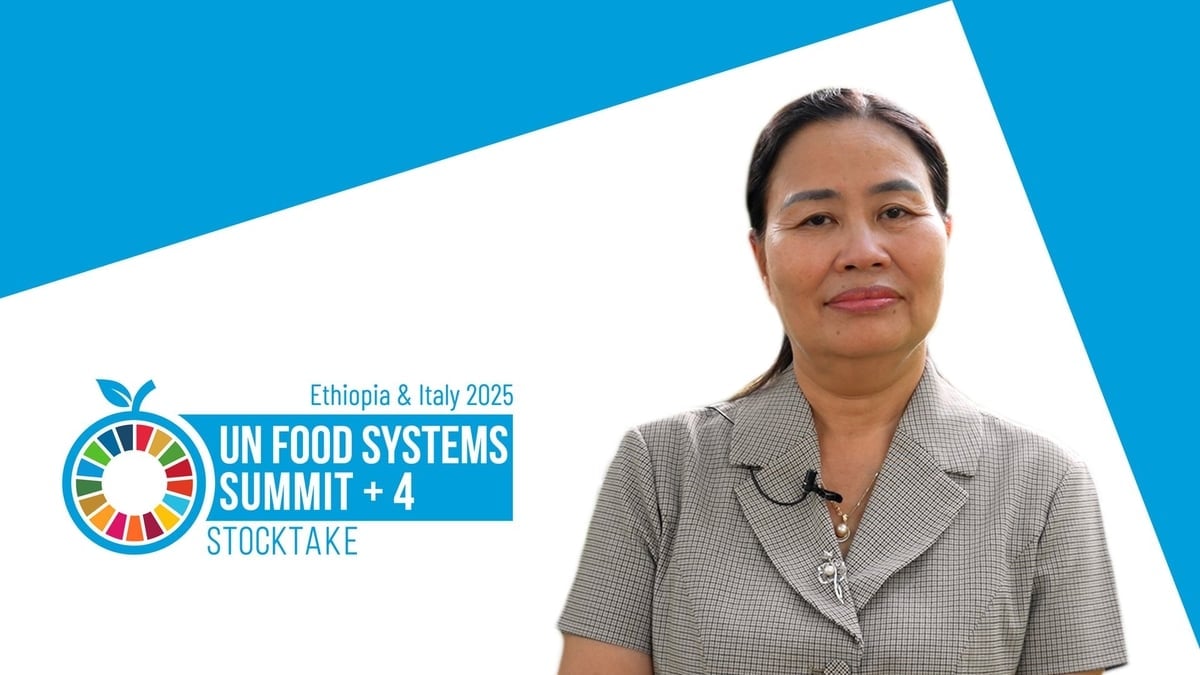December 8, 2025 | 14:56 GMT +7
December 8, 2025 | 14:56 GMT +7
Hotline: 0913.378.918
December 8, 2025 | 14:56 GMT +7
Hotline: 0913.378.918
The 2021 UN Food Systems Summit prioritized food security as a critical component of global initiatives to combat climate change and eradicate hunger. This significant milestone inspired several countries to pledge to expedite the transformation of food systems to achieve greater sustainability, inclusivity, and resilience.
From July 27-29, 2025, the United Nations Food Systems Summit +4 (UNFSS+4) conducted its second assessment in Addis Ababa, Ethiopia. The headquarters of the United Nations Economic Commission for Africa (UNECA) will host a special "Action Day" on July 27, 2025.
Representatives from the United Nations system, international, regional, and national organizations, policymakers, scientists, the private sector, food producers, and various other stakeholders will convene for this critical event. The overarching objective is to promote sustainable, resilient, and inclusive food systems for the benefit of all.

Dr. Nguyen Thi Thanh Thuy, Head of the International Cooperation Department, representing the Vietnam Gardening Association. Photo: Hung Khang.
The Vietnam Gardening Association (VACVINA) and other organizations co-hosted a side event titled “Tailoring Science, Technology, and Innovation to Local Contexts while Advancing Global Agendas: Lessons from Multi-Country, Cross-Sectoral Approaches to Agri-Food Systems Transformation” in collaboration with the Japan International Research Center for Agricultural Sciences (JIRCAS).
The event included speakers from various fields, including agriculture, forestry, nutrition, digital technology, government agencies, international organizations, businesses, non-governmental organizations, and professional associations, from countries such as Japan, Ethiopia, Vietnam, and Uganda.
This diversity enabled the exchange of practical experiences in the application and transmission of technological advancements and technology specifically tailored to national contexts. It also offered valuable insights into implementing a systemic approach to transforming the food system efficiently and sustainably.
Dr. Nguyen Thi Thanh Thuy, representing the Vietnam Gardening Association, delivered a presentation at the event. Her presentation discussed Vietnam's experiences in applying science, technology, and innovation, with a particular emphasis on the active participation of farmers and communities in the development of sustainable solutions.
Dr. Thuy also emphasized the Vietnam Gardening Association's function in advancing the integrated "garden-pond-cage" (locally known as VAC) economic model toward a circular economy through outreach activities, technical transmission, and cooperation with the goal of sustainable development.
During the roundtable discussion, representatives from organizations in Japan, Ethiopia, Uganda, and Vietnam unanimously emphasized the critical role of science, technology, and innovation in the transformation process.
According to the speakers, no unique model applies to all situations. Asia and Africa share a substantial commonality: the majority of agricultural producers are smallholder farmers, despite the fact that natural and socioeconomic conditions fluctuate across countries. Therefore, it is imperative to exchange practical solutions, knowledge-based tools, and regionally adaptable approaches to facilitate decision-making and achieve global climate, food security, and land degradation objectives.
The event laid the foundation for spreading lessons learned to support the global food system transformation, fostering opportunities for collaboration among various nations, sectors, and stakeholders.
During the event, Dr. Thuy provided a detailed explanation of the VAC model, a climate-resilient, cost-effective, and integrated farming system that is readily scalable. A circular economy results from integrating indigenous knowledge and innovation.
By forging partnerships with state agencies, international organizations, research institutes, cooperatives, and farmers, the Vietnam Gardening Association enhances community capacity, guarantees food security, and advocates for sustainable development, all while incorporating local knowledge with a global perspective.
Currently, the association is leveraging the collective power of businesses, farmer networks, cooperatives, industry associations, and experts to confront resource and climate challenges. According to Dr. Thuy, "We are endeavoring to establish a green, diverse, and scalable agriculture in the ecological farming regions of Vietnam".
Vietnam is actively engaged in promoting low-emission, environmentally friendly solutions founded on ecological agriculture and climate-adaptive technologies. It considers connecting real-world data, which enables agricultural systems to become more responsive and adaptable by implementing digital technology in technical consulting, traceability, and early warning systems.
"The transformation of food systems aligns perfectly with the National Strategy on Science, Technology, and Innovation (STI). We believe that innovation is a co-creation journey, nurtured by communities and disseminated in ways that are appropriate to specific conditions", Dr. Nguyen Thi Thanh Thuy affirmed.
As the world approach four years since the 2021 UN Food Systems Summit (UNFSS), UNFSS+4 will provide a platform for reflecting on progress, strengthening collaboration, and unlocking finance and investments to accelerate food systems transformation.
Translated by Linh Linh
![Hue aims for Net Zero: [5] Building a green and sustainable city](https://t.ex-cdn.com/nongnghiepmoitruong.vn/608w/files/content/2025/12/03/bai-5-anh-6-105459_830-111605.jpg)
(VAN) Hue City continues its efforts to build and maintain a green, sustainable, and environmentally friendly city, joining the Government in pursuing the goal of Net Zero by 2050.

(VAN) After 10 years of operation, Aus4Skills has awarded more than 500 scholarships and enhanced the skills of over 40,000 students, contributing to the strengthening of the strong relationship between the two countries.
![Hue aims for Net Zero: [4] The effectiveness of ERPA payments](https://t.ex-cdn.com/nongnghiepmoitruong.vn/608w/files/content/2025/12/02/bai-4-anh-1-103726_244-093242.jpg)
(VAN) In Hue City, ERPA payments have proven highly effective, serving as a green finance tool that helps reduce carbon and greenhouse-gas emissions and move closer to the Net Zero target.

(VAN) At the TARASA25 Conference, participating countries shared experiences on implementing agroecology and regenerative agriculture, contributing to a sustainable transformation of food and agriculture systems.

(VAN) Green industry is becoming a driving force for the development of Hue City, not only promoting economic growth but also protecting the environment, creating the foundation for the Net Zero goal.

(VAN) As of 2025, the ASEAN region has a total of 69 ASEAN Heritage Parks recognized across its 10 member states. Among them, Viet Nam contributes 15 ASEAN Heritage Parks.

(VAN) Yok Don National Park has high biodiversity with numerous endemic plant and animal species, and it is also the only dipterocarp forest ecosystem conservation area in Viet Nam.